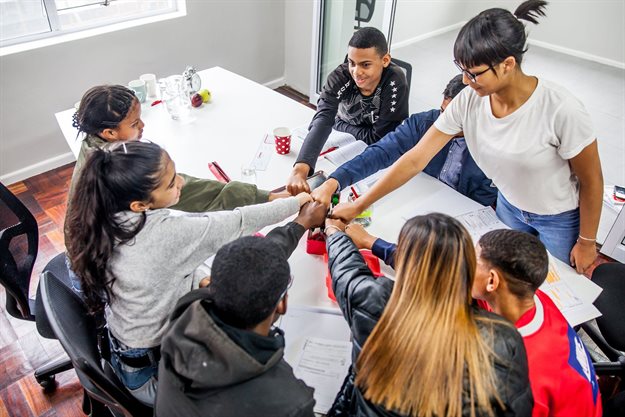
Top stories






More news

















Logistics & Transport
Uganda plans new rail link to Tanzania for mineral export boost









“Many teachers in our network have raised concerns that the 2021 academic year might follow a similar pattern. So we’ve developed seven strategies to help teachers across South Africa prepare for an unpredictable school year and set their learners up for productive learning in 2021,” says George Eadie, CEO of The Answer Series (TAS).
One can never be prepared enough when it comes to learning, so teachers often need to set the bar high. Having a library of educational resources at hand is the most effective strategy any teacher can adopt into their teaching process and in their classroom.
Habiel Adams, a Business Studies teacher at Christel House, notes how important planning is for teachers during uncertain times. “As cliche as it seems, effective planning is at the core of adequate curriculum management. Keep abreast of curriculum changes and familiarise yourself with the content of the exam guidelines and SBA requirements for your subject.”
Familiarise yourself with current textbooks and informative websites written by note-worthy names and businesses in the education industry.
The Answer Series has been committed to raising the standard of education in South Africa since 1975, and continue to assist teachers with a range of resources for teachers and free e-books, as well as study guides for students.
In uncertain times like these, staying on top of what you can control will settle the nerves and put you in good stead for a successful year, whether in the classroom or online.
Teachers may not have control over where their students are, but they do have control over how students access all the relevant information needed to complete the curriculum.
Jenny Campbell, mathematics author and publisher at TAS, suggests that each teacher “start by listing [their] teaching goals and objectives. These might be personal and will differ from teacher to teacher and from subject to subject.” By taking the time to map out the year and set short- and long-term personal milestones, teachers can create a sense of control over the outcomes of the year ahead.
Put together an emergency plan to manage situations that are uncertain at this stage, like how to prepare students for online learning; an action plan for staggered school days; or completing outstanding work from last year.
By living with the pandemic, everyone has realised that empathy and human kindness are essential to deal with the social effects of lockdowns.
Conceptualise a classroom management plan that will foster a supportive, caring atmosphere in the classroom.
Discuss the plan with your students and brainstorm ways to build a learning environment based on support. Start by pairing up students to build relationships. Encourage learners to share their experiences of lockdowns thus far and facilitate a group feedback session to discuss key takeaways and learnings. Lead by example and treat learners with respect and kindness.
Be aware of behavioural changes and social cues that may indicate that a learner is struggling with anxiety or emotional setbacks. Anxiety is not conducive to a productive learning mindset, so deal with these situations immediately and alert the school counsellor if necessary.

If 2020 is anything to go by, the 2021 school year is unlikely to follow a typical curriculum structure, and mixed learning approaches will continue to be utilised. Ensure that you stay malleable and prepare for unplanned changes to the school year or curriculum plan.
Teachers will continue, as always, to play an integral role in the success of their students’ school careers. Having a collection of resources to draw from in uncertain times, and creating a sense of routine with lesson plans, will allow teachers to motivate students to take responsibility for their studies and build discipline without constant supervision.
Your colleagues understand more than anyone the daily challenges and setbacks that come with teaching during Covid. There is strength in numbers, so lean on your colleagues and form a support system. Just as you would in the classroom by following a classroom management plan, discuss possible scenarios and solutions with your support group.
Adams suggests forming communities of collaborative learning best practices: “Form communities of best practices, where collective SBAs can be created, shared, and disseminated between participating neighbouring schools or schools in your district. In this way, the workload can be reduced significantly and insight can be gained into how different colleagues create assessment material.”
Show up every day for your students and cultivate a learning environment that is based on positivity, energy and confidence. In times of uncertainty, students will look to their teachers for guidance and assurance. Be honest and upfront with your students about the unfolding situation and offer possible solutions that your learners can be involved in, such as running a morning routine of check-in calls with small groups and setting daily priorities. Lead by example – and lead with confidence.
Uncertainty is overwhelming and even though teachers soldier on for the sake of their students, you are not immune to burnout and anxiety. To ensure you function at your best during school hours as well as after school, book time in your calendar to relax, get exercise and look after yourself. Tune out of school mode for a few hours a day by setting boundaries and making time for activities you enjoy beyond the classroom.
“With the first term kicking off, we recommend a learning strategy to set up for a successful year, no matter how the learning process takes shape. Take a deep breath and remember, if you can’t control the current of the river, you might as well go with the flow,” concludes Eadie.